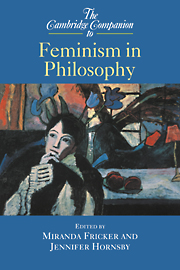Book contents
- Frontmatter
- Introduction
- 1 Feminism in ancient philosophy
- 2 Feminism in philosophy of mind
- 3 Feminism in philosophy of mind
- 4 Feminism and psychoanalysis
- 5 Feminism in philosophy of language
- 6 Feminism in metaphysics
- 7 Feminism in epistemology
- 8 Feminism in epistemology
- 9 Feminism in philosophy of science
- 10 Feminism in political philosophy
- 11 Feminism in ethics
- 12 Feminism in ethics
- 13 Feminism in history of philosophy
- Further reading
- Index
1 - Feminism in ancient philosophy
The feminist stake in Greek rationalism
Published online by Cambridge University Press: 28 May 2006
- Frontmatter
- Introduction
- 1 Feminism in ancient philosophy
- 2 Feminism in philosophy of mind
- 3 Feminism in philosophy of mind
- 4 Feminism and psychoanalysis
- 5 Feminism in philosophy of language
- 6 Feminism in metaphysics
- 7 Feminism in epistemology
- 8 Feminism in epistemology
- 9 Feminism in philosophy of science
- 10 Feminism in political philosophy
- 11 Feminism in ethics
- 12 Feminism in ethics
- 13 Feminism in history of philosophy
- Further reading
- Index
Summary
Introduction
Despite the internal diversity of extant 'ancient philosophy', it has generally been agreed that the main intellectual legacy of classical Greece and Rome to the modern world is the idea of the value of truth and the capacity of human reason to discover it. This idea, powerfully expressed in the dialogues of Plato and in the more systematic teaching of Aristotle, has provided an implicit point of reference - usually, though not invariably, positive - for all subsequent 'philosophy' in the western world, and feminist thought has been no exception to the rule. What remains unresolved, however, is the proper ratio of positive to negative in the attitude of feminism to 'reason'. Since the eighteenth century at least, there has been an effort to rethink the rationalist ethical and political tradition for the benefit of women, and to detach its characteristic themes (legitimate social order; mutual recognition among citizens; co-operative pursuit of a common good) from the ideology of male supremacy. But the sexual egalitarianism which we inherit from the age of Enlightenment is complicated, today, by a rival impulse of solidarity with what the rationalist tradition symbolically excludes - that is, with reason's supposedly feminine 'other' or complement. It is this tension that sets the scene for our discussion.
- Type
- Chapter
- Information
- The Cambridge Companion to Feminism in Philosophy , pp. 10 - 28Publisher: Cambridge University PressPrint publication year: 2000
- 3
- Cited by



